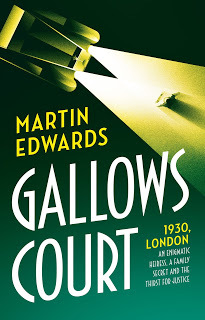Copy-editing a Manuscript - Why does it matter?
A few weeks ago, I attended an enjoyable Society of Authors event in Harrogate. Among a number of interesting people whom I met for the first time was Louis Greenberg, the chap who copy-edited Gallows Court - a very pleasant surprise! All the more pleasant since I'd found his copy-editing very efficient indeed. And this matters, because it's really important to make sure that a book on which one has laboured long and hard doesn't falter at the last fence because of a lack of care in production. Yes, there will always be some things that slip through the net - regrettable, but that's life. However, a professional writer cares very much about trying to keep glitches to a minimum, and the reality is that one needs help on this, because so often the original author sees what he or she thinks should be on the page - not what is actually there!
On discovering that Louis is himself an author as well as an editor I suggested that he contribute a guest post about the art of editing. He kindly obliged - and here's the result:
"When Head of Zeus asked me to copy-edit Martin Edwards’ Gallows Court, I jumped at the chance. It’s an enticing mystery set in 1930 London and I felt transported into the fog and freeze of that dark winter and the intricate and compelling murder plot that plays out there. But at the same time, I suspected that it would be a challenge – to find something to correct.

Copy-editing is a fine-tooth, stickling business, a different mental process from the creative splurge of drafting fresh fiction. Even writers who can edit will struggle to inhabit both headspaces on the same project. As an author myself, I think of myself as author’s editor, sensitive to retaining the writer’s voice, wisdom and intentions. I like to treat my clients’ manuscripts with the respectful care and attention I hope will be given to my own work.
Even when copy is very clean, each book throws up its own themes: in one job I’ll find myself revisiting everything I knew about the use of the appositive compound modifier; in another, pondering the semantic philosophy behind serial commas.
I’ve written marginal opinion pieces about the spelling of whisky, the naturalisation of corporate neologisms, the most efficient rendering of non-standard gangster slang, and the language-rotting tendency to forget plurals when on safari. I’ve contributed to house style guides on italicisation of non-English terms and consulted manufacturers’ guides on the correct typography of HK VP9s, RAP-401s and GTIs – then broken those rules when the author has a consistent, deliberate case.
Still, when it came to Gallows Court, I knew I’d struggle. Martin is such a vastly experienced novelist and, as suspected, the plot was seamlessly rendered and the research meticulous. I get a hit of nerdish serotonin when I’m editing a historical novel and catch an anachronism before it gets to print, but Gallows Court only offered me only one, very marginal, case. In the end all I could offer Martin was some nitpicking on honorific capitalisation and hyphenated compounds. I’m glad he didn’t find it unbearably irritating and still invited me to write this post!
https://louisgreenberg.com/etc.html"
On discovering that Louis is himself an author as well as an editor I suggested that he contribute a guest post about the art of editing. He kindly obliged - and here's the result:
"When Head of Zeus asked me to copy-edit Martin Edwards’ Gallows Court, I jumped at the chance. It’s an enticing mystery set in 1930 London and I felt transported into the fog and freeze of that dark winter and the intricate and compelling murder plot that plays out there. But at the same time, I suspected that it would be a challenge – to find something to correct.

Copy-editing is a fine-tooth, stickling business, a different mental process from the creative splurge of drafting fresh fiction. Even writers who can edit will struggle to inhabit both headspaces on the same project. As an author myself, I think of myself as author’s editor, sensitive to retaining the writer’s voice, wisdom and intentions. I like to treat my clients’ manuscripts with the respectful care and attention I hope will be given to my own work.
Even when copy is very clean, each book throws up its own themes: in one job I’ll find myself revisiting everything I knew about the use of the appositive compound modifier; in another, pondering the semantic philosophy behind serial commas.
I’ve written marginal opinion pieces about the spelling of whisky, the naturalisation of corporate neologisms, the most efficient rendering of non-standard gangster slang, and the language-rotting tendency to forget plurals when on safari. I’ve contributed to house style guides on italicisation of non-English terms and consulted manufacturers’ guides on the correct typography of HK VP9s, RAP-401s and GTIs – then broken those rules when the author has a consistent, deliberate case.
Still, when it came to Gallows Court, I knew I’d struggle. Martin is such a vastly experienced novelist and, as suspected, the plot was seamlessly rendered and the research meticulous. I get a hit of nerdish serotonin when I’m editing a historical novel and catch an anachronism before it gets to print, but Gallows Court only offered me only one, very marginal, case. In the end all I could offer Martin was some nitpicking on honorific capitalisation and hyphenated compounds. I’m glad he didn’t find it unbearably irritating and still invited me to write this post!
https://louisgreenberg.com/etc.html"
Published on August 21, 2018 04:17
No comments have been added yet.



